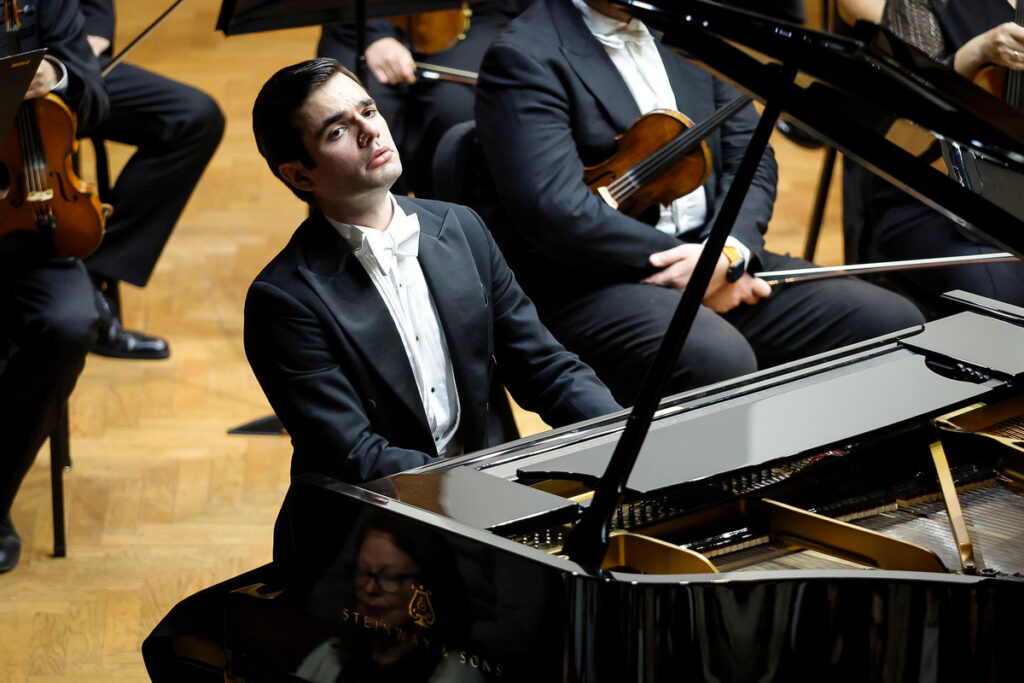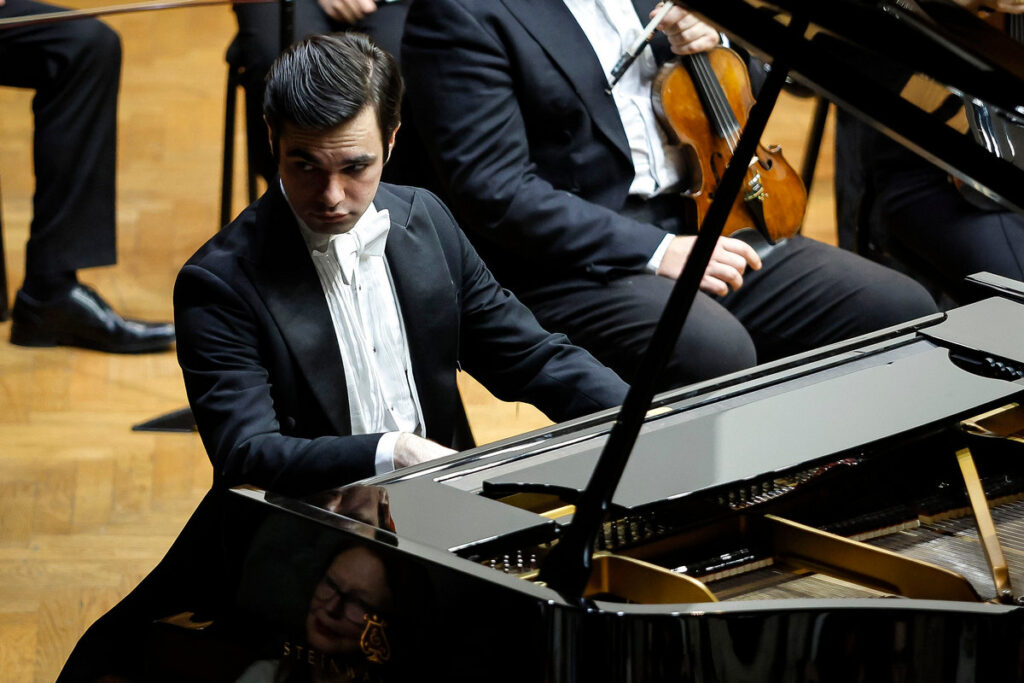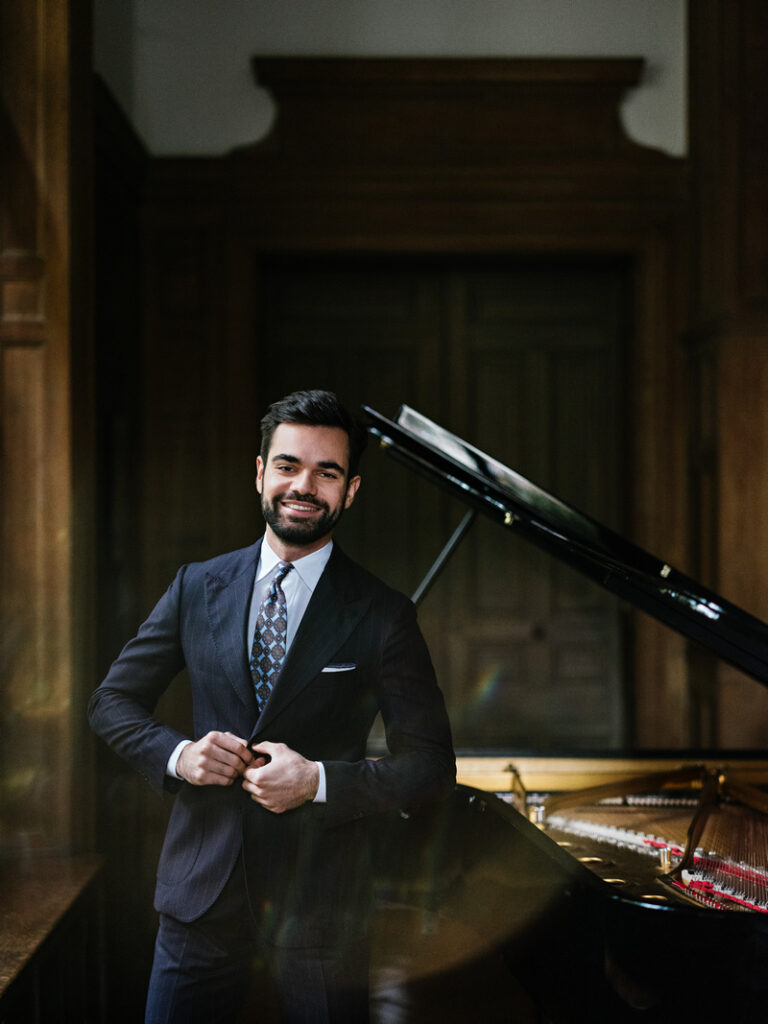On a Belgrade debut, Armenian roots, and the universal language of music

CULTURAL INTERVIEW
by Dragan Nikolić
This interview was given during the musician’s guest performance with the Belgrade Philharmonic at the end of May, organised by ArtLink. The concert took place on May 30, 2025, in the Grand Hall of the Kolarac Foundation as part of ArtLink’s programming.
Even those who have never heard of Armenian tradition can be moved by this music
This will be your debut performance with the Belgrade Philharmonic. How are you preparing for this collaboration, and what can the audience expect from the concert on May 30th at Kolarac?
First of all, I would like to say that it was an honour and a pleasure to collaborate for the first time with the Belgrade Philharmonic Orchestra. Belgrade is a city that holds a special place in my heart, as it is my mother’s hometown. My first concert there took place eleven years ago, in 2014, when I had the opportunity to perform Rachmaninoff’s Piano Concerto n.2 with the Radio-Television Orchestra under Maestro Bojan Sudjic. Since then, I had the chance to play some memorables concerts in Belgrade, from a shared evening with Michel Dalberto celebrating the 100th anniversary of the Armistice in 2018, to a New Year’s Eve Gala at the iconic Sava Center, not to mention an unforgettable open-air solo recital at Kalemegdan Park, just beneath the “Pobednik” Statue, in 2020. This time was also strongly emotional, as I was performing a piece – Khachaturian’s Piano Concerto op.38 – that echoed my own family roots. I was more than happy to team up with conductor Daniel Raiskin and the formidable musicians of the BPO.

Your album Origins is dedicated to Armenian musical heritage. How did you select the repertoire for this project, and in what ways has your Armenian background influenced your interpretation of these works?
I have been exploring the Armenian piano repertoire, which my father, of course, introduced to me when I was a child, for more than ten years now. I first started to play, as encores at the end of my concerts, some short pieces by Arno Babadjanian, like the Prelude & Vagharshapat Dance, for example. I immediately noticed that the audience was reacting very positively, even enthusiastically, which certainly encouraged me to continue on this path. An important milestone was the recording, in 2021, of Babadjanian’s Heroic Ballad (together with Rachmaninoff’s Piano Concerto n.2) with the Bern Symphony Orchestra under Maestro Stefan Blunier, for Claves Records. Finally, after dedicating several solo albums to Chopin, Rachmaninoff and Debussy, I felt that it was the right moment to build a project entirely devoted to Armenian solo piano music. I selected four different composers (Komitas, Khachaturian, Babadjanian, and my father, Gérard Gasparian), representing nearly the entire 20th century. My idea was to show the extreme diversity of Armenian music (going from the mystical simplicity of Komitas to the flamboyant and polyphonic pianism of Babadjanian, from lyricism to percussiveness, from melancholy to jubilation, from Romantic expression to experimental Dodecaphonism, etc.), and at the same time its profound unity, which is given by its folk roots.
The album includes compositions by your father, Gérard Gasparian, inspired by the poetry of Sayat-Nova. What was it like to perform music that is both a part of your family legacy and a cultural tradition?
Having the opportunity to work on a piece with the composer himself is always an incredibly enriching experience. All the more so when it happens that the composer is your father! While thinking about the program of Origins, my father’s Ballade and Poème came to mind immediately because – and this is not the case with all of Gérard Gasparian’s compositions, obviously – those two have an explicit link to Armenian tradition, as they are based upon songs by the legendary poet from the 18th century, Sayat Nova. Furthermore, it seemed interesting to put them together because, even if they were written almost simultaneously, in 1988/1989, and even if they share a common inspiration (Sayat Nova), they present two very contrasting musical universes. While the Ballade is reminiscent of Babadjanian, with its polyphonic and virtuosic pianism, the Poème is a more meditative piece in my opinion, which, in terms of harmonic language, is much closer to French music. That’s another perfect example of the multiple, and virtually infinite styles and aesthetics, in which composers can appropriate a common folk reservoir. It was also a beautiful way of illustrating the personal trajectory of my father, who was born in Yerevan before moving to France with his family as a teenager.
How do elements of traditional Armenian music, such as rhythms and melodic patterns, influence your interpretative style and repertoire choices?
In the booklet of my album Origins, I quoted Sergei Rachmaninoff saying that “those countries which are the richest in folk songs are naturally the ones to develop the greatest music”. There is an apparent paradox that is of great interest to me. If you take Armenian music (but that is not the only example, of course), it is rooted in a very specific cultural context, and it constantly nourishes itself from the rich repertoire of Armenian folk songs, melodies, dances, etc. But at the same time – and this is something that never ceases to fascinate me – people that have no familiarity whatsoever with Armenian tradition can be moved, touched, and amazed by this music. That proves its universality: it is capable of transcending epochs and cultural spheres. Even if its source is very specific, very particular, it can speak to everyone, everywhere. That is the sign of a truly creative appropriation of local folklore.
This relationship with Armenian music that I have been cultivating for many years surely incited me to explore more intensively the works of authors that drew inspiration from popular traditions: Debussy, Bartók, of course, a lot of Russian, Spanish, American composers as well…

Although you were born and raised in France, how has your Armenian heritage shaped your artistic identity, and how does that connection manifest in your work?
My family roots as well as my musical background are a crossroad of influences. As I said before, my father helped me discover the richness of 20th-century Armenian music. But as a profound lover of French repertoire, he also made me listen, from a very young age, to the treasures of Debussy and Ravel, for instance. My mother, born in Yugoslavia, who studied at the legendary Gnessin Institute in Moscow, is the one who gave me the very first piano lessons, transmitting a precious pedagogical knowledge inherited from the Russian School. During my studies, I had the chance to learn from both French and Russian masters, given that in parallel to my lessons at Paris Conservatoire with fantastic musicians such as Jacques Rouvier, Michel Beroff and Michel Dalberto, I followed the advice of highly inspiring personalities such as Tatiana Zelikman and Elisso Virsaladze during masterclasses abroad. I guess that this mixed background naturally reflects itself in my playing and in my repertoire, where French, Russian and Armenian composers hold a special place.
French, Russian, and Armenian composers hold a special place in my repertoire
Are there any future projects planned that will further explore Armenian musical traditions or feature collaborations with Armenian artists?
I am planning to continue including Armenian music in my programs. I recently had the opportunity to perform for the first time Gagik Hovunts’ Piano Concerto in Yerevan with the Armenian State Symphony Orchestra, and I am currently working on another solo masterpiece by Arno Babadjanian, the Six Pictures, that I will start performing from next season. We are also elaborating some very interesting projects with contemporary composer Michel Petrossian, based in Paris. Then I would like, in the near future, to play my father’s Sonata, for solo piano, which is an ambitious, half-hour work. One of my dreams would be to record Khachaturian’s op.38 one day as well, as it is a piece that, in my opinion, deserves to be considered among the greatest piano concertos of the last century.